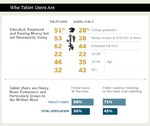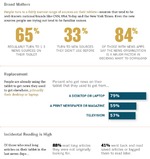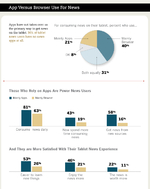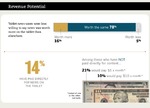'The Tablet Revolution' offers mixed prospects for news organizations
 Tuesday, October 25, 2011 at 1:01 AM
Tuesday, October 25, 2011 at 1:01 AM The Pew Research Center tonight released a wonderful study that uncovers all kinds of surprises related to 1,159 tablet users, and more specifically, 894 who read news on their tablets at least weekly.
The study, officially titled "The Tablet Revolution and What It Means for the Future of News," was conducted in conjunction with Pew's Project for Excellence in Journalism and The Economist Group, the British publishers who have been at the vanguard of paid-digital content initiatives. I think they got their money's worth.
 Tablet owners represent an affluent, educated demographic (Graphic: Pew Research Center).Some takeaways from tablet users:
Tablet owners represent an affluent, educated demographic (Graphic: Pew Research Center).Some takeaways from tablet users:
- 11 percent of U.S. adults own "a tablet computer of some kind," this just 18 months after Apple launched the iPad. The study isn't specific on what brands make up tablets but indicates iPads are owned by the large majority of
 Brand is a factor in generating app downloads, but no necessarily for paying for news (Graphic: Pew Research Center).respondents, and questions how next month's launch of the Amazon Kindle will change usage and behavior by bringing a lower-cost alternative to the masses.
Brand is a factor in generating app downloads, but no necessarily for paying for news (Graphic: Pew Research Center).respondents, and questions how next month's launch of the Amazon Kindle will change usage and behavior by bringing a lower-cost alternative to the masses. - 77 percent use their tablets daily, and for an average of 90 minutes. Wow.
- 71 percent prefer to to read or listen to news rather than watch it. That compares with 45 percent of the general audience,
 On a platform where apps make so much sense, more tablet owners prefer to discover news through their browser. There are many questions as to why this is, but I'm still shocked by this finding (Graphic: Pew Research Center).and is one sign newspaper companies may have opportunities to find new audiences moving forward.
On a platform where apps make so much sense, more tablet owners prefer to discover news through their browser. There are many questions as to why this is, but I'm still shocked by this finding (Graphic: Pew Research Center).and is one sign newspaper companies may have opportunities to find new audiences moving forward. - Apps aren't the be-all-end-all for news companies. Thirty-six percent of respondents have not installed any news apps. On top of that, "the study reveals that, so far, while about of two-thirds of tablet news users have a news app on their tablet, the browser, carried over from the desktop experience, is still the more popular means of consuming news."
 A sizable percentage of tablet owners have paid for news content but converting the majority who prefer free or low-cost options will be a challenge for news organizations (Graphic: Pew Research Center).Equally interesting is search is less of a factor on tablets, perhaps because typing can be more difficult. In my experience, apps are the way to go: so much easier, more fun, more rewarding, but perhaps some people just find them too confining.
A sizable percentage of tablet owners have paid for news content but converting the majority who prefer free or low-cost options will be a challenge for news organizations (Graphic: Pew Research Center).Equally interesting is search is less of a factor on tablets, perhaps because typing can be more difficult. In my experience, apps are the way to go: so much easier, more fun, more rewarding, but perhaps some people just find them too confining. - Following up on that, dynamic news aggregators like Flipboard and Pulse are far down the list of popular news apps. Contrast that with me, who considers a non-traditional news source like Flipboard to be mind-bogglingly addictive and so full of serendipity.
- Getting tablet owners to pay for news is a mixed bag. Just 14 percent said they "have paid directly to access news on their tablet" (although it should be noted that's nearly three times the percentage Pew reported earlier this year had paid for online news). Add 23 percent who use their tablets to access subscriptions to a print newspaper or magazine. That's probably not surprising, but there appears to be a huge gap in terms of prospects for converting the two-thirds who haven't paid for news. The study said, "Cost is a factor, even among this heavy news consuming population. Of those who haven't paid directly, just 21 percent said they would be wiling to spend $5 per month if that were the only way to access their favorite source on the tablet. And of those who have news apps, fully 83 percent say that being free or low cost was a major factor in their decision about what to download." Let's pile on some more: Just 5 percent of tablet readers who preferred browsers over apps have paid for news on their tablets. Ugh.
- "Brand is important on the tablet," but that loyalty only goes so far in terms of paying for content. "When asked specifically about the "driving factor" in their decisions to download apps and pay for content, "The two most important factors are whether the app is offered by a trusted brand and low cost -- much more so than recommendations from friends or positive reviews. This bodes well for news organization (sic) with strong well-established brands, but it does not mean that brand equity will necessarily translate into revenue." Eighty-four percent of tablet news users say liking a news organization is key to downloading their app. "Just as many say that the app being free, or low cost, is a major factor."
- The study contains some interesting data suggesting a lower price may actually drive slightly more revenue when it comes to getting news available nowhere else. Half of users were asked if they would pay $5 per month for news and half were asked if they would pay $10. "Twenty-one percent said they would be willing to pay $5 and half as many, 10 percent, said they would pay $10 per month for their favorite source on the tablet if it were the only way to access this content."
- Tablet owners are "nearly twice as likely as U.S. adults overall to have a household income of at least $75,000 per year." This is where Kindle Fire is poised to make major inroads in an untapped audience, the majority of Americans whose incomes are lower.
There's so much more in this study that it's almost overwhelming, even for someone like me who's paid to figure out how to best deliver local news to smartphones and tablets. The 24-page summary is a laundry list of interesting nuggets, but after awhile I got numb as I waded through upbeat news here, challenges there. Read it for yourself, and let me know what you think. Let's take on this challenge -- I mean opportunity -- together.
 Media
Media 
Reader Comments